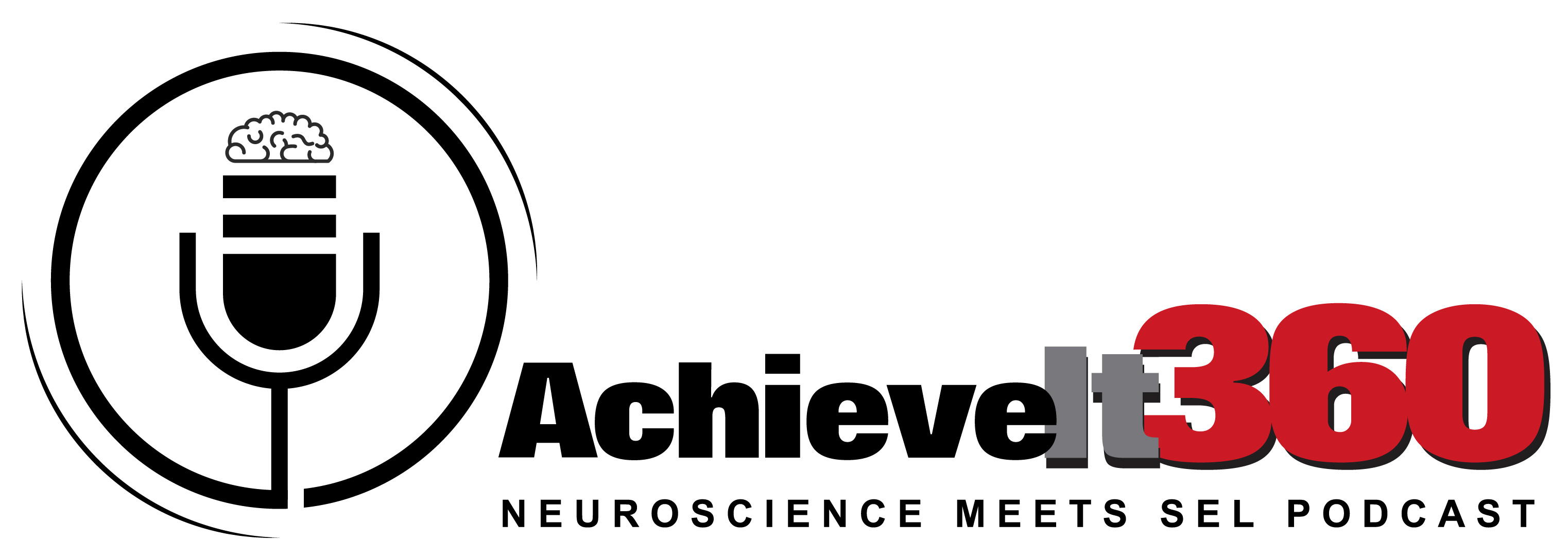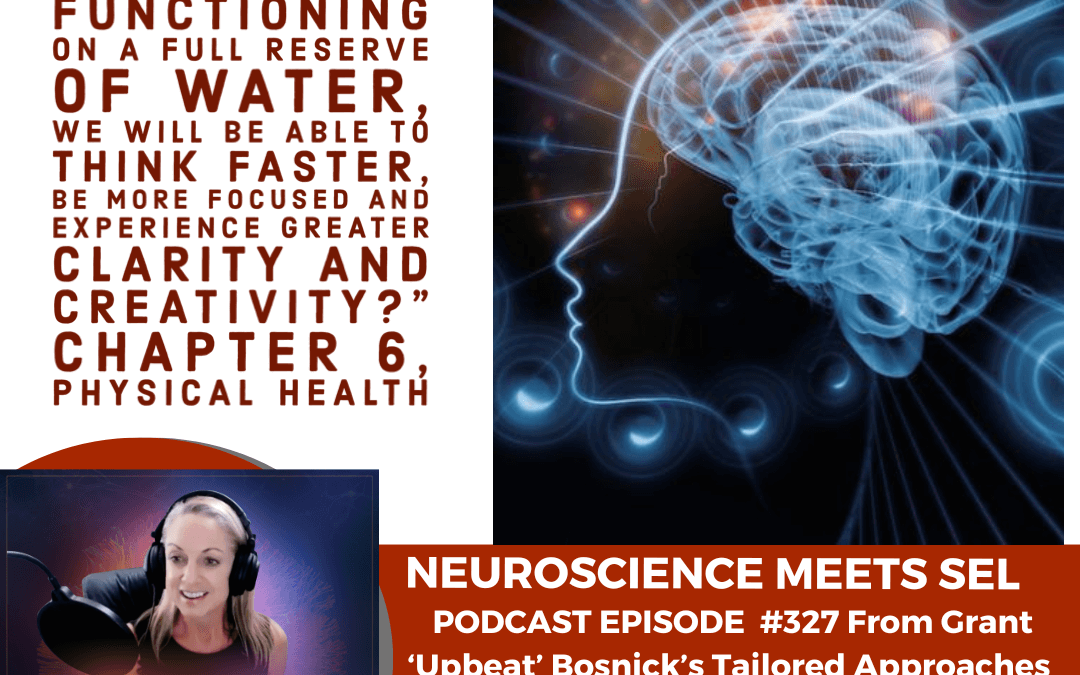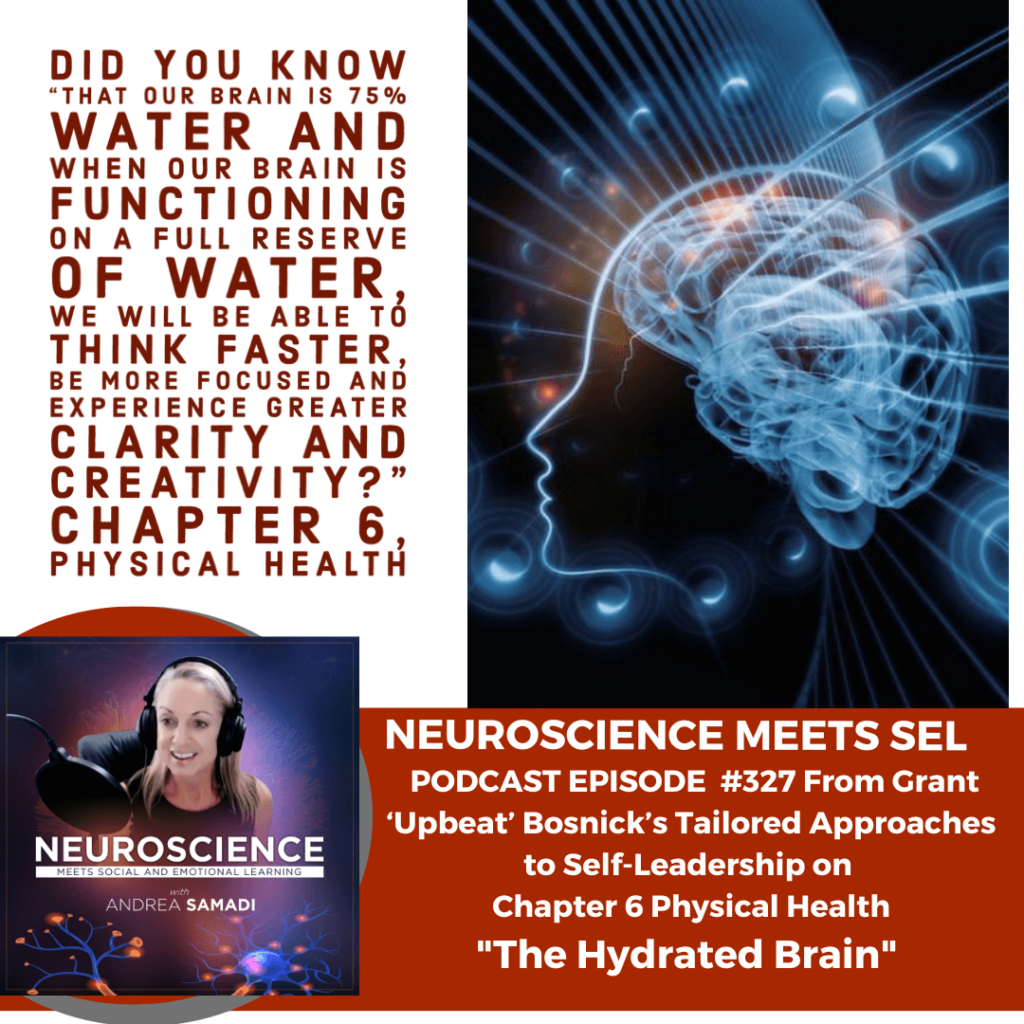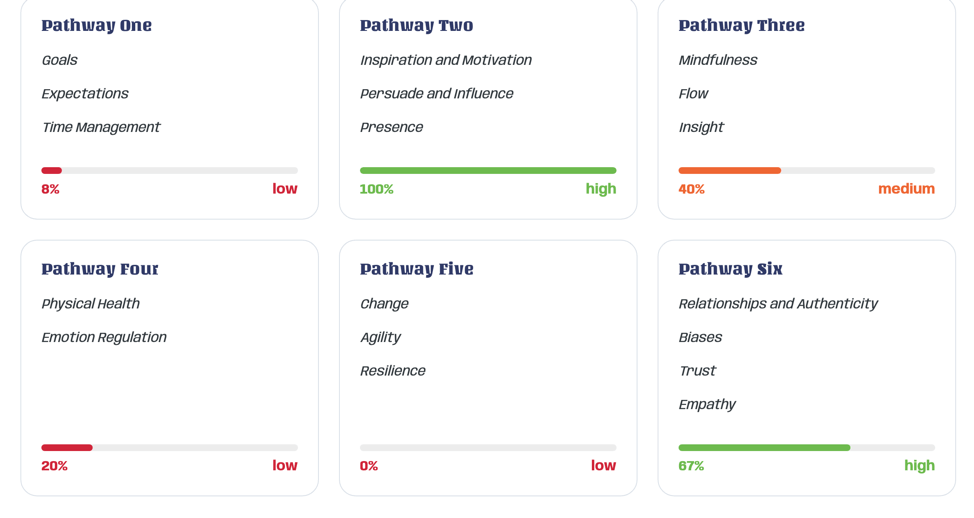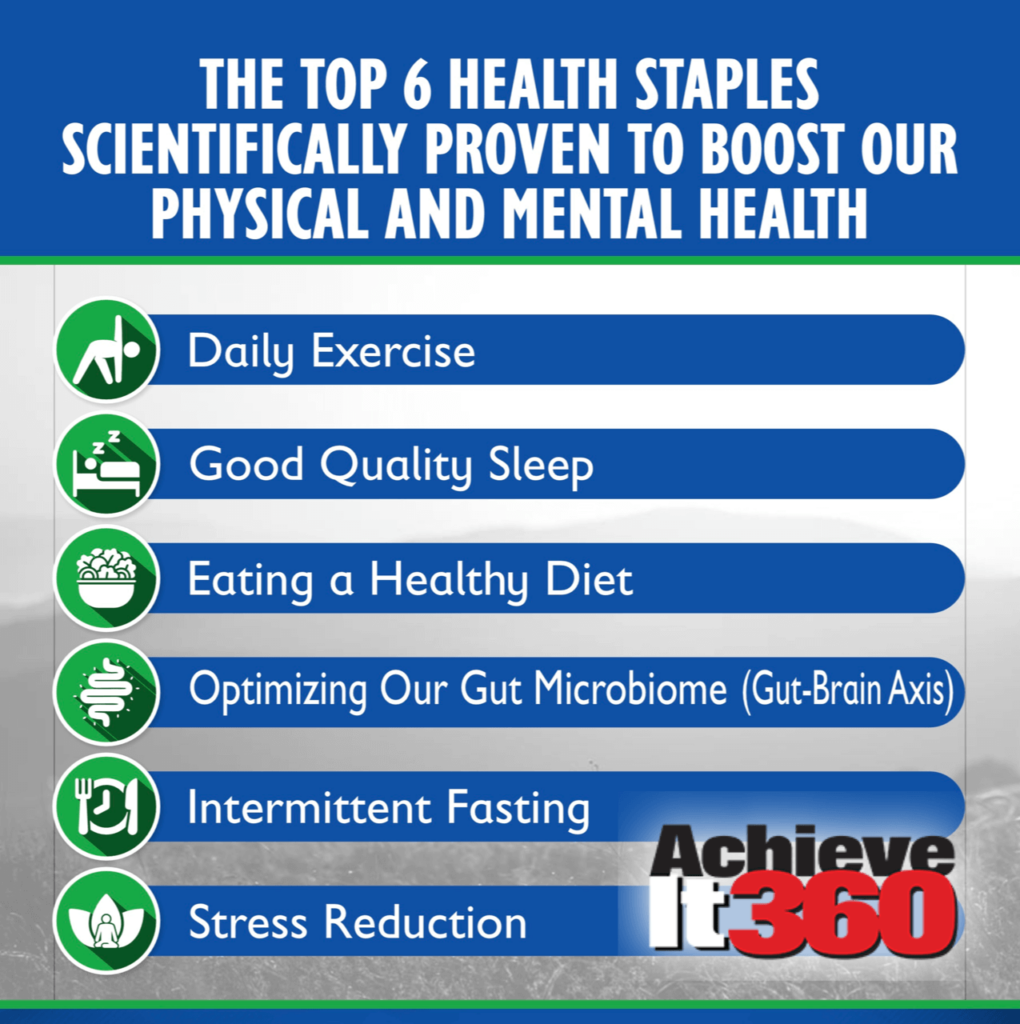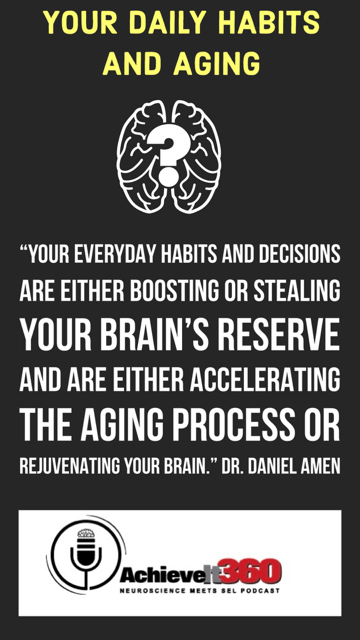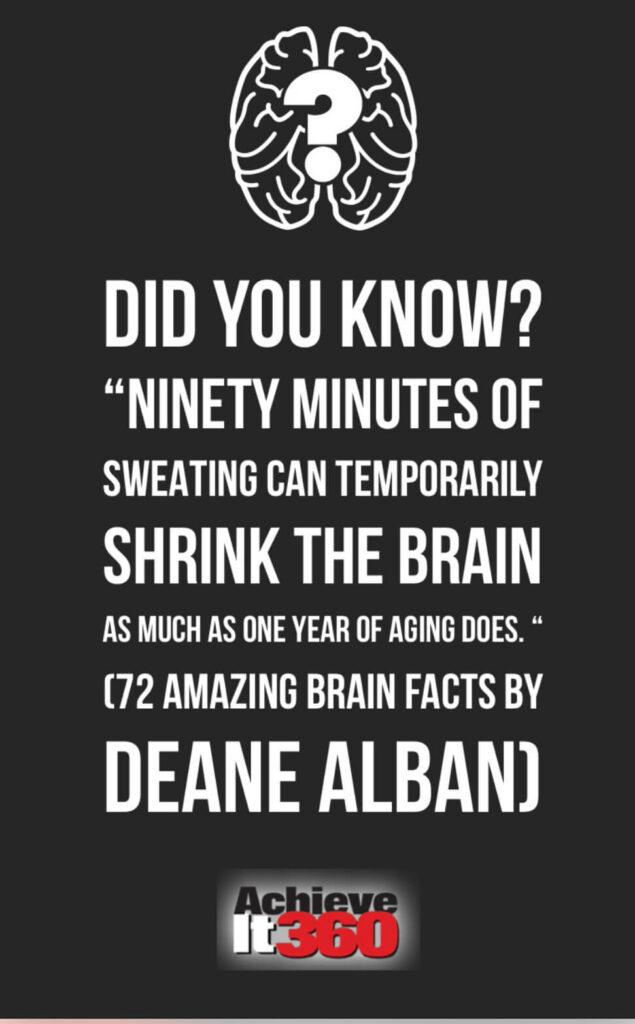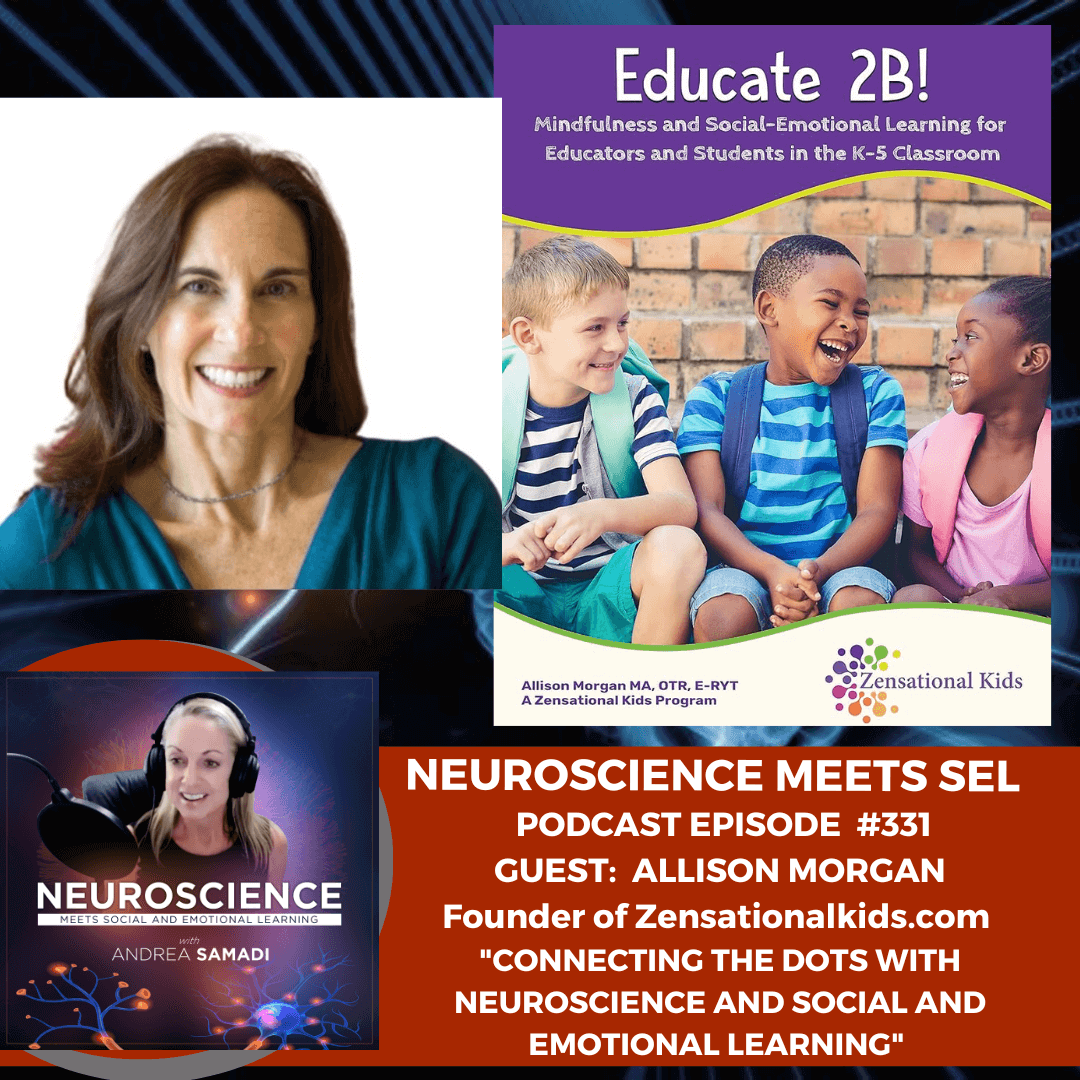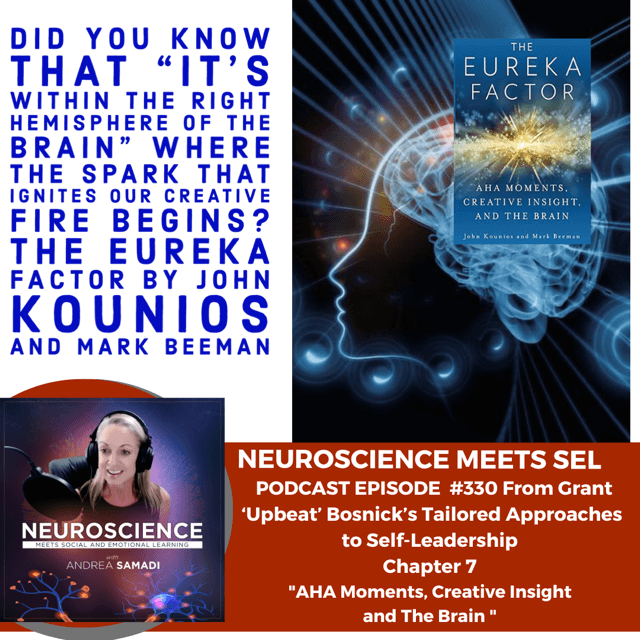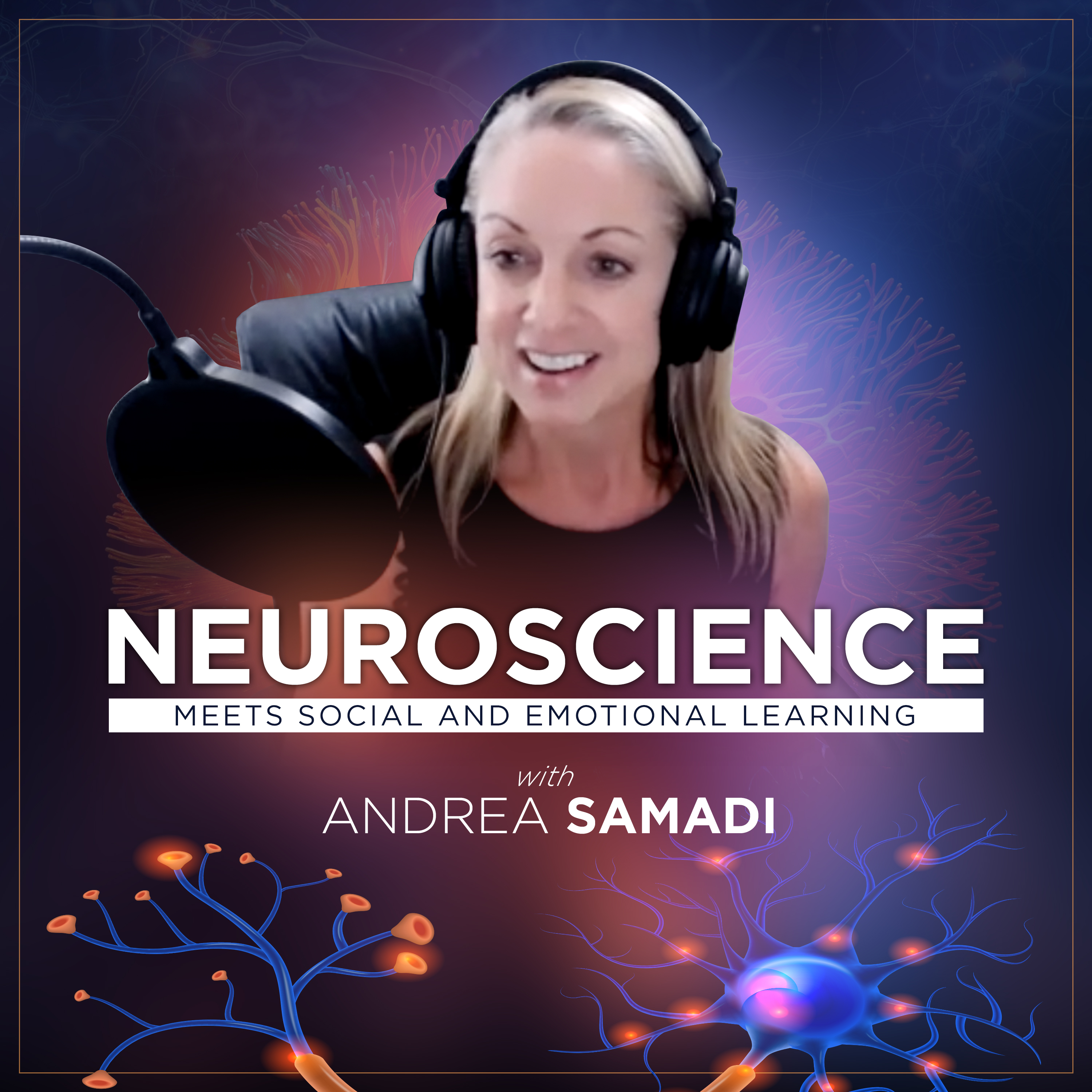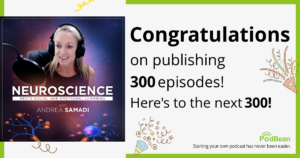Join us as we revisit episode 327 of the “Neuroscience Meets Social and Emotional Learning Podcast”, where we hone in on the critical relationship between hydration and brain health. Host Andrea Samadi delves into the sixth chapter of Grant Bosnick’s book during an 18-week self-leadership series, elucidating how focusing on our physical health can sharpen our cognitive performance. This episode is a paradigm shift, captivating listeners with the powerful impacts of nutrition and hydration on the brain. Andrea explores the benefits of water for our brain health and productivity, explaining how adequate hydration can improve concentration, cognition, mood and memory. The episode also explores other aspects of physical health like exercise, sleep and mindfulness, and how they contribute to overall wellness, well-being, achievement and productivity.
Welcome back to SEASON 11 of The Neuroscience Meets Social and Emotional Learning Podcast, where we connect the science-based evidence behind social and emotional learning and emotional intelligence training for improved well-being, achievement, productivity and results—using what I saw as the missing link (since we weren’t taught this when we were growing up in school), the application of practical neuroscience. I’m Andrea Samadi, an author, and an educator with a passion for learning and launched this podcast 5 years ago with the goal of bringing ALL the leading experts together (in one place) to help us to APPLY this research in our daily lives.
On today’s episode #327 we continue with our 18-Week Self-Leadership Series based on Grant Bosnick’s “Tailored Approaches to Self-Leadership: A Bite Size Approach Using Psychology and Neuroscience” that we first dove into with our interview on EP #321[i] just a few weeks ago. Now that we have started this series, I hope you can see how practicing and strengthening the skills we are learning each week, is cumulative. Each week, we are learning something new, that builds off the prior week, to help take us to greater heights in 2024.
In this 18-week Series that we began in the beginning of February, we are covering:
✔ Powerful tactics from this Grant Bosnick’s award-winning book that illustrates how change and achievement are truly achievable both from internal (‘inside out’) and external (‘outside in’) perspectives.
✔Listeners will grasp the immense power of self-leadership and its transformative effect on personal growth and success by applying the neuroscience Grant has uncovered in each chapter.
✔Explore practical strategies for habit formation and the impact of a self-assessment system.
✔Gain insights from Grant’s expert advice on maintaining a balance between strengths and weaknesses while chasing after your goals.
✔Embark on an intellectual journey that has the power to elevate personal achievement and self-awareness to uncharted levels while we map out our journey over this 18-week course.
There is great power and self-awareness that comes along with mapping out a plan designed specifically for YOU and I do encourage everyone to take Grant Bosnick’s Leadership Self-Assessment[ii] so you can see the areas for you that score a high, medium of low level of importance for you to focus on this year.
For Today, EPISODE #327, Chapter 6, “The Science Behind our Physical Health” we narrow our focus from a wide and complex topic to something we can implement immediately: Today we will consider “The Hydrated Brain for Improving Our Cognitive Performance”
✔ A Review of the Top Health Staples that we have covered on this podcast over the years, specifically since the Pandemic.
✔ How Dehydration Affects Our Cognitive Performance
✔ Tips Grant Bosnick Suggests for Keeping Our Brain Hydrated
✔ Focusing on One Area of Your Physical Health at a Time
Today we dive into Chapter 6 of Grant Bosnick’s book as we cover “The Science Behind Our Physical Health” which came out as LOW importance (red score) for me, alongside emotion regulation. If you have taken the self-assessment, you’ll know it’s how you answer the questions, based on what’s of high priority for you, that determines the lessons that are important to begin now, or ones that you might think you have a handle on, so they show up as lower priority like this topic did for for me. Not that physical health, or emotion regulation is of low priority for me, it’s quite the opposite, but I block out time in the day for both of these topics, and this time is non-negotiable.
I will say that while the broad term of physical health (that Grant covers in Pathway 4 of his book) is extremely important to me, it is a very complex topic and one we’ve been focused on since the pandemic geared us into looking closer at our physical and mental health.
We created the Top Health Staples[iii] That Are Scientifically Proven to Boost Our Physical and Mental Health where we’ve now added a 6th with stress reduction, for Podbean’s Wellness Week back in 2020, when I was asked to cover this topic. It was here where we shifted our attention to be equally as focused on the health of our mind (our mental health) in addition to our physical health. You can’t have one without the other.
When guests have approached me over the years to join us on the podcast, if they fall into these health staples with an angle I’ve not yet covered, it’s easy to say yes, so we can keep moving our physical and mental health forward. We are always looking for WHAT’S NEW and INNOVATIVE in this area.
How many times have we seen Dr. Gregory Kelly[iv] from Neurohacker.com who is focused on pioneering systems for human optimization and longevity? Twice so far and he’s on the schedule the middle of April to cover Qualia NAD+ where we will learn more about NAD+ that is often called the “aging” molecule due to its profound influence on how well (or how poorly) we will age.
We recently met Dimitri Leonov[v] with a new nanotechnology I’ve been wearing since our interview the end of this year, that’s been spotted on celebrities like Robert Downey Jr.
We are always looking for what’s new to take us to new heights with our physical and mental health, with some exciting and NEW innovators who we will be covering in the next few months.
So what does Grant Bosnick say about physical health is his book “Tailored Approaches to Self-Leadership?” He begins with the importance of looking at what we eat and asks “what is it doing to your brain?” (Chapter 6, Bosnick). What I like about Grant’s book, and why I wanted to cover EACH chapter over the next 18 weeks, is because it’s a paradigm shift for us to think about how ANYTHING we do impacts our brain.
THINK ABOUT THIS FOR A MINUTE:
25 years ago, when I was setting goals for my future, no one said to me “Hey Andrea, think about how your brain will tie into the goals you are setting” or “what foods are you eating for your brain health” or even “Did you know that exercise will build a stronger, more resilient brain?” I didn’t even begin to consider my brain until 2014 when Jeff Kleck, an Arizona School Administrator that we met on EP 246[vi] shared all his notes, books and resources with me, urging me that understanding how our brain operates, will be of critical importance in our future.
Boy was he ever right. I still keep in touch with him, and let him know all the time just how grateful I was for the time he spent explaining what he had learned about the brain with me.
Grants goes over foods that are important for our brain health and productivity, specifically foods that have a low glycemic index “which means they release energy slowly into the bloodstream.” (Chapter 6, Bosnick).
We’ve covered this topic on various episodes, specifically with “The Damaging Impacts of Sugar on the Brain and Body”[vii] and we’ve even used a glucose monitor to test what happens to our body with too much sugar, and how it can tank our overall health and productivity.
While reading this chapter, Grant echoed many of the experts I’m sure you’ve heard us mention, like Dr. Daniel and Tana Amen, from their Brain Warrior’s Way Podcast who reminded us to always make decisions with our brain in mind by thinking or saying out loud with everything that we do “Is this decision GOOD for my brain, or NOT” Dr. Amen said many things that caught my attention while listening to his podcast years ago, and I often took his words of wisdom and created graphics to keep his thoughts close. While talking about our daily habits and aging (which I know we all want to do gracefully) he reminded us that “your everyday habits and decisions are either boosting or stealing your brain’s reserve and are either accelerating the aging the process (which none of us want to do on purpose) or rejuvenating your brain.”
It was Dr. Amen[viii] who first caught my attention with the importance of loving my brain, this organ that controls everything that I am and everything that I do.
Finally, it was when Dr. Amen mentioned that “Your competitive advantage or disadvantage is the actual physical functioning of your brain.” (Dr. Amen from The Brain Warrior’s Way Podcast) This statement made me take a good look at whether I was boosting my brain reserve and rejuvenating the aging process, or accelerating it.
Grant covers many of the Top Health Staples in chapter 6, highlighting what many experts have been hitting home for us over the past few years, like the importance of sleep, taking power naps and adding in ideas for relaxation with mindfulness, and massage, but it was his focus on breathing that “helps with emotion regulation and memory recall” (Chapter 6, Bosnick) that caught my attention in Chapter 6.
I remember watching Stanford Professor Dr. Andrew Huberman demonstrate how to “Self-Regulate Your Brain in Less Than a Minute”[ix] on one of his podcast episodes and it was so impactful to me that I use his method all the time now. I love how Grant covers how to use pranayama breathing for “emotional recognition and memory” (Chapter 6, Bosnick) as well as for “increasing concentration.”
This topic of Physical Health is complex, and we can go into many different directions, which is why we created the Top 6 Health Staples to stay focused on moving the needle towards physical health with one idea at a time. I noticed that I would work on one area, like sleep for instance, and could see improvements here, but another area would suffer. It’s a balancing act for sure, requiring focused attention.
So today, to keep it simple, I want to focus on something that we might forget about our brain, and our physical health and that is that “our brain is 75% water. (And) When our brain is functioning on a full reserve of water, we will be able to think faster and be more focused and experience greater clarity and creativity.” (Chapter 6, Bosnick).
Grant reminds us in Chapter 6 of the importance of hydration, and says that “water is essential for delivering nutrients to our brain and for removing toxins. When our brain is fully hydrated, the exchange of nutrients and toxins will be more efficient—thus ensuring better concentration and mental alertness.”
Grant mentions that our brain is “75% water” (Chapter 6, Bosnick) and of the importance of hydration, and I remembered learning that “90 minutes of sweating can temporarily shrink the brain as much as one year of aging does.” From Deane Alban’s 72 Amazing Brain Facts. This brain fact brought home for me, just how important hydration is for our brain health.
You will need to read Chapter 6 of Grant’s book to receive all of his tips, but he does cover the many BENEFITS of drinking water.
He says that keeping our brain hydrated helps us with:
- Improving concentration and cognition
- Helping to balance our mood and emotions
- Maintaining a good memory
- Boosting our brain’s reaction time
- Increasing blood flow and oxygen to the brain
- Preventing and relieving headaches
- Reducing stress
REVIEW AND CONCLUSION
To review and conclude this week’s episode #327 on Chapter 6 on Physcial Health, we narrow our focus to “Our Hydrated Brain.”
DID YOU KNOW:
“That our brain is 75% water and when our brain is functioning on a full reserve of water, we will be able to think faster, be more focused and experience greater clarity and creativity?” (Chapter 6, Bosnick).
Grant reminds us that “everyone is unique and needs different amounts of water per day (but suggests) an adequate intake for men is roughly around 3 liters (100 fluid ounces) a day, (and) for women it’s about 2.2 liters (74 fluid ounces) a day.
THINK ABOUT THIS?
Knowing how important water is for the brain, do you know how much water you drink? I’ve definitely started paying more attention to this, especially knowing how “sweating can temporarily shrink the brain.” I’ve been using an infrared sauna, and another health device that calls for an increase in water intake, and I can tell with 100% certainty that when I’m not drinking enough water, it shows up with my ability to think with clarity.
What do you think? Could you improve your water intake? Just by thinking about ways to improve our brain health, we will over time begin to move the needle in the direction of physical health and wellness, which was the concept that Grant wanted us to uncover in Chapter 6. I hope you learned something new, perhaps a new angle for your physical health, as you think about ways to stay hydrated as we all look for new ideas to improve our health in 2024.
REVIEW Chapters 2, 3, 4 and 5
It’s here I’m hoping we will take the information we are learning, connect the dots to form knowledge and then apply this knowledge to become wise. This is where we go from theory to practice with this podcast.
REFLECT Back to Chapter 2 on The Neuroscience of Goals (and Kurt Lewin’s Force Field Theory): What are you doing today to gain the momentum needed to reach NEW and HEIGHTENED levels of performance this year? How are you improving your mental and physical health to gain the momentum we talked about in this chapter?
REFLECT Back to Chapter 3 on The Neuroscience of Inspiration: How are you using people or places that inspire you, to take your results to greater heights? Think about this as it relates to your physical and mental health. What inspiration do you need to take more action in this area?
REFLECT Back to Chapter 4 on The Neuroscience of Mindfulness: Where are you in your Mindfulness Journey? Mindfulness, and breathing was listed often in Chapter 6. How is mindfulness helping you with your physical health?
REFLECT Back to Chapter 5 on The Neuroscience Behind Peak Performance: How are you practicing “getting into flow?” When do you notice it the most? Is it during physical exercise, or meditation? Are you practicing this state to gain 5x more productivity in this state?
I’ll close out this episode with a quote that I’m hoping will urge all of us to grab a glass of water as we THINK about how we will implement this powerful concept into our week.
Loren Eisley said “If there is Magic on this planet, it is contained in water” and I’ll have to agree. Grant taught us how drinking water helps us, improving our concentration, cognition, mood, emotions, memory, reaction time, increasing oxygen to our brain, preventing head aches and reducing stress.
So go grab a glass of water, and I’ll see you next week with Chapter 7 on Insight.
REFERENCES:
[i]Neuroscience Meets Social and Emotional Learning Podcast EPISODE #321 with Grant ‘Upbeat’ Bosnick https://andreasamadi.podbean.com/e/insights-from-grant-upbeat-bosnick/
[ii] Self-Assessment for Grant Bosnick’s book https://www.selfleadershipassessment.com/
[iii] Neuroscience Meets Social and Emotional Learning Podcast BONUS EPISODE Recorded for Podbean’s Wellness Week “The Top 5 Health Staples” https://andreasamadi.podbean.com/e/bonus-episode-a-deep-dive-into-the-top-5-health-staples-and-review-of-seasons-1-4/
[iv] Neuroscience Meets Social and Emotional Learning Podcast EPISODE #285 with Dr. Gregory Kelly on “How to Beat Aging and Stress with Qualia Senolytics” https://andreasamadi.podbean.com/e/dr-gregory-kelly-from-neurohacker-collective-on-how-to-beat-aging-and-stress-with-qualia-senolytics/
Neuroscience Meets Social and Emotional Learning Podcast EPISODE #305 with Dr. Gregory Kelly on Qualia Synbiotics https://andreasamadi.podbean.com/e/returning-guest-dr-gregory-kelly-on-qualia-synbiotic-optimizing-digestion-and-mood-with-prebiotics-probiotics-and-postbiotics/
[v] Neuroscience Meets Social and Emotional Learning Podcast EPISODE #318 with Dmitri Leonov on Taopatch, Nanotechnology for Health and Wellness of the Future https://andreasamadi.podbean.com/e/dmitri-leonov-on-taopatch-understanding-nanotechnology-for-health-and-wellness-of-the-future/
[vi]Neuroscience Meets Social and Emotional Learning Podcast EPISODE #246 with Jeff Kleck on “Using Neuroscience to Inspire Thinkers in our Schools, Sports and the Workplace” https://andreasamadi.podbean.com/e/jeff-kleck-on-using-neuroscience-to-inspire-thinkers-in-schools-sport-and-the-workplace/
[vii] Neuroscience Meets Social and Emotional Learning Podcast EPISODE #275 “The Damaging Impacts of Sugar on the Brain and Body” https://andreasamadi.podbean.com/e/brain-fact-friday-the-damaging-impacts-of-sugar-on-the-brain-and-body/
[viii] The Daniel Plan by Dr. Amen https://www.danielplan.com/change-your-brain-change-your-life-2/
[ix]Neuroscience Meets Social and Emotional Learning Podcast EPISODE #273 On Self-Regulation https://andreasamadi.podbean.com/e/brain-fact-friday-on-self-regulation-using-neuroscience-to-regulate-automatic-negative-thoughts-emotions-and-behaviors/
Click here for more episodes of the Neuroscience Meets Social and Emotional Learning Podcast
Podcast: Play in new window | Download
Subscribe: Apple Podcasts | RSS
